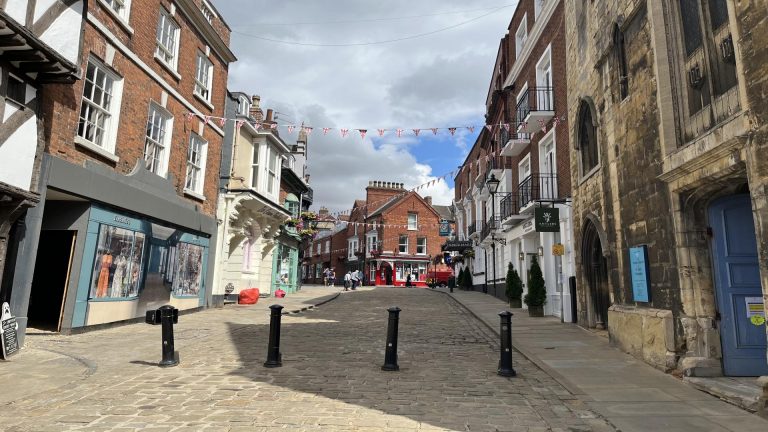Free wi-fi comes to South Kesteven towns
Demolition works begin at Boston leisure centre
O’Brien’s Optician owner marks new achievement
Small steps, safer streets in Scunthorpe
Efforts to improve safety and wellbeing in Scunthorpe are beginning to show results as North Lincolnshire Council continues to roll out targeted initiatives in partnership with police and community groups.
A renewed focus on street-level issues such as drinking, fly-tipping, and unlicensed trading has led to a string of enforcement actions. Public Space Protection Orders have been extended, illicit tobacco and vapes have been seized from multiple premises, and two serious offences are now with the Crown Court.
Retail inspections found alcohol licence breaches in six shops, though only one required formal action. A new selective licensing scheme is also in place, aimed at improving standards in rental housing.
Beyond enforcement, the council has stepped up local engagement. Environmental clean-up projects have been run alongside faith and cultural groups, and new health and education services have been introduced in key neighbourhood hubs.
There’s now a new one-way traffic system to ease congestion, and patrols during busy periods are helping address noise, litter, and trading issues.
With additional funding secured and enforcement hours extended, the council says it’s aiming to make neighbourhoods not just safer, but more connected and confident.
Image credit: North Lincolnshire CouncilNew health institute launched to address rural and coastal health challenges
The University of Lincoln has launched the UK’s first dedicated institute to tackle health disparities in rural and coastal communities. The Lincoln Institute for Rural and Coastal Health (LIRCH), based in Mablethorpe at the newly developed Campus for Future Living, aims to address health inequalities affecting 85% of the UK’s landmass.
LIRCH is backed by a £10.9 million grant from the UKRI Research England – Expanding Excellence in England (E3) fund. The initiative focuses on integrated, multi-disciplinary research to develop practical solutions tailored to the needs of these underserved areas. The Institute aims to improve access to healthcare and address the impact of factors like climate change and socio-economic deprivation, which contribute to higher rates of preventable illnesses and lower life expectancy in rural and coastal regions.
The launch event featured key speakers, including Professor Mark Gussy, Director of LIRCH, and Claire Woodward, Director of Community Investment at ACIS Group. The event was also supported by Professor Chris Whitty, Chief Medical Officer for England, who spoke remotely and underscored the significance of the new institute in improving health outcomes across rural and coastal communities.
The Campus for Future Living, which serves as the new home for the Institute, underscores LIRCH’s commitment to creating community-driven, place-based health solutions. Through collaboration with local councils, community organisations, and healthcare providers, LIRCH will develop research that aims to drive meaningful, long-term impact in these regions.
Image credit: University of LincolnTourism makes £3bn economic impact across Lincolnshire
Figures for 2024 have revealed the total value of the visitor economy for Greater Lincolnshire surpassed £3bn.
Bungee jumping buddies take on Whitby Viaduct for Lincolnshire’s hospitals
Lincoln’s historic Bailgate set for stonework makeover
Lincolnshire County Council is moving ahead with plans to restore the worn stone surface of Bailgate, aiming to preserve the street’s heritage while improving durability.
Installed in 2010 to match the area’s historic character, the Yorkstone blocks have begun to shift, crack and loosen due to the failure of their original sand base. Council engineers now propose relaying most of the existing stones on a stronger mortar foundation to prevent further damage. Broken blocks would be replaced with new ones in the same style.
If approved, the project would begin in January 2026 and last up to three months, depending on weather. Around 65% of the original stones—approximately 32,000—could be salvaged and reused. The estimated cost for the work is just over £1.7 million.
While traffic plans are still being finalised, phased road closures will be necessary. Pedestrian access and entry to homes and businesses will be maintained throughout the project. Final dates and traffic details are expected to be announced later this year.
Image credit: Lincolnshire County CouncilSkegness theme park makes list of UK’s most budget-friendly days out
With summer holidays in full swing, families looking to entertain the kids without spending a fortune might be in luck. A new ranking by Outdoor Toys has named Fantasy Island in Skegness as one of the UK’s cheapest theme parks for children.
Coming in fourth, the Lincolnshire-based park offers a day wristband for kids at £20.50. There’s also the option to buy two or seven-day passes for better value, ideal for families planning a longer stay. While entry is free for those not keen on rides, Fantasy Island still has plenty on offer, including a bustling seven-day market, riverside attractions, and a broad range of rides for all ages. On-site accommodation makes it a viable choice for a budget-friendly staycation.
Topping the affordability list is Playland Fun Park in Worcestershire. It has no entry fee, and rides start from just £1 each. With 20 attractions, a splash park, and a picnic area for families bringing their own food, it’s a clear winner for frugal days out.
Other parks in the top five include The Web Adventure Park near York, which offers tickets at £17.95 with access to animal encounters and foam parties, Camel Creek Adventure Park in Cornwall with bonus seven-day passes, and BeWILDerwood in Cheshire, where under £23 covers everything from treehouses to live shows.
Image credit: Stock.adobe.com/Electric Egg Ltd.North Lincolnshire makes recycling easier with new bin system
North Lincolnshire residents can expect a more convenient recycling system starting April 2026, as the council prepares to simplify household waste collections.
The updated service will replace the current multiple-container setup with a single large burgundy bin for dry recyclables like plastic, metal, glass, paper, card, and textiles. This move eliminates the need for separate boxes and aims to make sorting waste far less confusing.
Food and garden waste will be collected weekly in one combined bin, while general waste will be picked up every two weeks using the existing grey or green bin.
The council is also keeping its green waste collection free, a contrast to charges introduced in other areas, while promising clearer guidance ahead of the rollout. A local education campaign is planned to help households adapt.
With less than 0.3% of local waste now going to landfill, North Lincolnshire ranks among the country’s top-performing areas for recycling. The new system is designed to build on that success by making it even easier for residents to reduce, reuse, and recycle at home.
Image credit: North Lincolnshire Council











